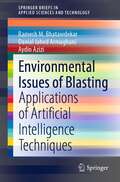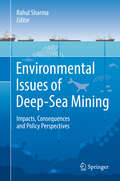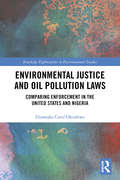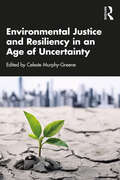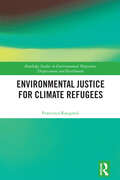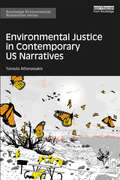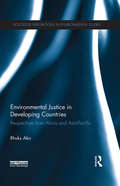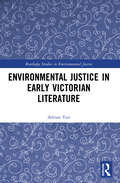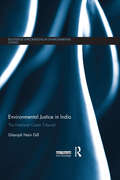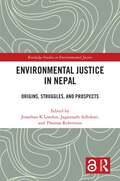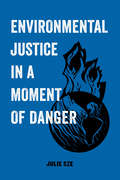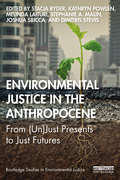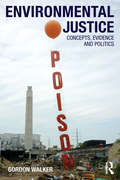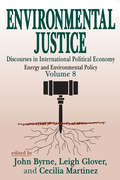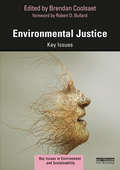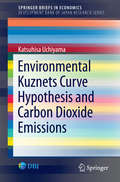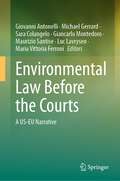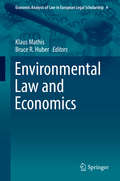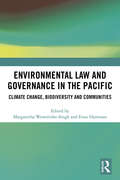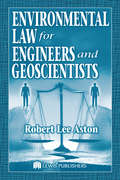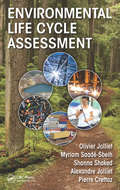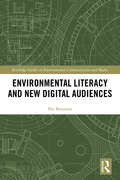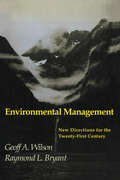- Table View
- List View
Environmental Issues of Blasting: Applications of Artificial Intelligence Techniques (SpringerBriefs in Applied Sciences and Technology)
by Aydin Azizi Danial Jahed Armaghani Ramesh M. BhatawdekarThis book gives a rigorous and up-to-date study of the various AI and machine learning algorithms for resolving environmental challenges associated with blasting. Blasting is a critical activity in any mining or civil engineering project for breaking down hard rock masses. A small amount of explosive energy is only used during blasting to fracture rock in order to achieve the appropriate fragmentation, throw, and development of muck pile. The surplus energy is transformed into unfavourable environmental effects such as back-break, flyrock, air overpressure, and ground vibration. The advancement of artificial intelligence and machine learning techniques has increased the accuracy of predicting these environmental impacts of blasting. This book discusses the effective application of these strategies in forecasting, mitigating, and regulating the aforementioned blasting environmental hazards.
Environmental Issues of Deep-Sea Mining: Impacts, Consequences and Policy Perspectives
by Rahul SharmaThis volume discusses environmental issues associated with deep-sea mining, with an emphasis on potential impacts, their consequences and the policy perspectives. The book describes the methods and technologies to assess, monitor and mitigate mining impacts on marine environments, and also suggests various approaches for environmental management when conducting deep-sea mining. The volume brings together information and data for researchers, contractors, mining companies, regulators, and NGOs working in the field of deep-sea mining. Section 1 highlights the various environmental issues and discusses methods and approaches that can help in developing environmentally sustainable deep-sea mining. Section 2 details the results and outcomes of studies related to impact assessment of deep-sea mining, and proposes methods for monitoring. Section 3 discusses the need and means for developing data standards and their application to deep-sea mining. Section 4 discusses the policies, approaches, and practices related to deep-sea mining, suggests formats for developing environmental impact statements (EIS) and environmental management plans (EMP), and describes national and international regulations for environmental management. Section 5 concludes the text by putting deep-sea economic activities into an environmental context and conducting techno-economic analyses of deep-sea mining and processing.
Environmental Justice and Oil Pollution Laws: Comparing Enforcement in the United States and Nigeria (Routledge Explorations in Environmental Studies)
by Eloamaka Carol OkonkwoThis book explores the relationship between oil pollution laws and environmental justice by comparing and contrasting the United States and Nigeria. Critically, this book not only examines the fluidity of oil pollutions laws but also how effective or ineffective enforcement can be when viewed through the lens of environmental justice. Using Nigeria as a case study and drawing upon examples from the United States, it examines the legal and institutional challenges impacting upon the effective enforcement of laws and provides a contrasting view of developed and developing countries. Focusing on the oil and gas industry, the book discusses the laws and international acceptable standards (IAS) in these industries, the principles behind their application, the existing barriers to their effective implementation, and how to overcome those barriers. Utilising an environmental justice framework, the book demonstrates the synergy between policy-making, human rights, and justice in oil-producing regions as well as addressing the importance of protecting the rights of minorities. Through a comparative analysis of the United States and Nigeria, this book draws out enforcement approaches and mechanisms for tackling oil-related pollution with a view to reducing environmental injustice in developing countries. Examining the role of NGOs in pursuing environmental justice matters, the book showed the regional courts as one avenue of overcoming the enforcement challenges faced by the developing countries. This book will be of great interest to students and scholars of environmental law, environmental justice, minorities' rights, business and human rights, energy law, and natural resource governance.
Environmental Justice and Resiliency in an Age of Uncertainty
by Celeste Murphy-GreeneThis book examines the issue of environmental justice across 11short chapters, with the aim of creating a resilient society. Starting with a history of the environmental justice movement, the book then moves on to focus on various current environmental issues, analyzing how these issues impact low-income and minority communities. Topics covered include smart cities and environmental justice, climate change and health equity, the Flint Water Crisis, coastal resilience, emergency management, energy justice, procurement and contract management, public works projects, and the impact of COVID-19. Each chapter provides a unique perspective on the issues covered, offering practical strategies to create a more resilient society that can be applied by practitioners in the field. Environmental Justice and Resiliency in an Age of Uncertainty will be of interest to upper level undergraduate and graduate students studying race relations, environmental politics and policy, sustainability, and social justice. It will also appeal to practitioners working at all levels of government, and anyone with an interest in environmental issues, racial justice, and the construction of resilient communities.
Environmental Justice for Climate Refugees (Routledge Studies in Environmental Migration, Displacement and Resettlement)
by Francesca RosignoliThis book explores who climate refugees are and how environmental justice might be used to overcome legal obstacles preventing them from being recognized at an international level. Francesca Rosignoli begins by exploring the conceptual and complex issues that surround the very existence of climate refugees and investigates the magnitude of the phenomenon in its current and future estimates. Reframing the debate using an environment justice perspective, she examines who has the responsibility of assisting climate refugees (state vs non-state actors), the various legal solutions available and the political scenarios that should be advanced in order to govern this issue in the long term. Overall, Environmental Justice for Climate Refugees presents a critical interrogation of how this specific strand of forced migration is currently categorized by existing legal, ethical and political definitions, and highlights the importance of applying a justice perspective to this issue. Exploring the phenomenon of climate refugees through a multi-disciplinary lens, this book will be of great interest to students and scholars of environmental migration and displacement, environmental politics and governance, and refugee studies.
Environmental Justice in Contemporary US Narratives: Environmental justice in contemporary U.S. narratives (Routledge Environmental Humanities)
by Yanoula AthanassakisEnvironmental Justice in Contemporary US Narratives examines post-1929 US artistic interrogations of environmental disruption. Tracing themes of pollution, marine life, and agricultural production in the work of a number of historically significant writers including John Steinbeck, Ruth Ozeki, and Cherríe Moraga, this book outlines a series of incisive dialogues on transnational flows of capital and environmental justice. Texts ranging from The Grapes of Wrath (1939) to Body Toxic (2001) represent the body as vulnerable to a host of environmental risks. They identify "natural disasters" not just as environmental hazards and catastrophes, but also as events intertwined with socioeconomic issues. With careful textual analysis, Athanassakis shows how twentieth- and twenty-first-century US writers have sought to rethink traditional understandings of how the human being relates to ecological phenomena. Their work, and this study, offer new modes of creative engagement with environmental degradation – engagement that is proactive, ambivalent, and even playful. This book contributes to vital discussions about the importance of literature for social justice movements, food studies, ecocriticism, and the environmental humanities. The core argument of the book is that artistically imaginative narratives of environmental disturbance can help humans contend with ostensibly uncontrollable, drastic planetary changes.
Environmental Justice in Developing Countries: Perspectives from Africa and Asia-Pacific (Routledge Explorations in Environmental Studies)
by Rhuks AkoThe evolving environmental justice paradigm is conceptualized differently based on political, economic and historical factors. In developed countries, emphasis is placed on the role of individuals in environmental decision-making and the protection of their access to the prerequisite environmental information and capacity to challenge environmental decisions is the main focus. However, in developing countries, access to land and natural resources are considered integral elements of environmental justice paradigm. This book focuses on the conceptualization, recognition and protection of environmental justice in developing countries. It explores the situation by engaging an analytical discourse of relevant legal provisions in four case study countries including Nigeria, South Africa, India and Papua New Guinea. The comparative analysis of environmental justice in these countries present a framework within which to appreciate the conceptualization of the environmental justice paradigm
Environmental Justice in Early Victorian Literature (Routledge Studies in Environmental Justice)
by Adrian TaitThis innovative new book combines environmental justice scholarship with a material ecocriticism to explore the way in which early Victorian literature (1837–1860) responded to the growing problem of environmental injustice. As this book emphasises, environmental injustice – simply, the convergence of poverty and pollution – was not an isolated phenomenon, but a structural form of inequality; a product of industrial modernity’s radical reformation of British society, it particularly affected the working classes. As each chapter reveals in detail, this form of environmental inequality (or ‘classism’) drew sharply critical reactions from figures as diverse as Thomas Carlyle, Friedrich Engels, Charles Dickens, and John Ruskin, and from within the Chartist movement, as working-class writers themselves reacted to the hazardous realities of a divided society. But as this book also reveals, these writers recognised that a truly just society respects the needs of the nonhuman and takes account of the material world in all its own aliveness; even if only tentatively, they reached for a more inclusive, emergent form of justice that might address the social and ecological impacts of industrial modernity, an idea which is no less relevant today. This book represents an indispensable resource for scholars and students working in the fields of Victorian literature, environmental justice, and ecocriticism.
Environmental Justice in India: The National Green Tribunal (Routledge Explorations in Environmental Studies)
by Gitanjali Nain GillModern environmental regulation and its complex intersection with international law has led many jurisdictions to develop environmental courts or tribunals. Strikingly, the list of jurisdictions that have chosen to do this include numerous developing countries, including Bangladesh, Kenya and Malawi. Indeed, it seems that developing nations have taken the task of capacity-building in environmental law more seriously than many developed nations. Environmental Justice in India explores the genesis, operation and effectiveness of the Indian National Green Tribunal (NGT). The book has four key objectives. First, to examine the importance of access to justice in environmental matters promoting sustainability and good governance Second, to provide an analytical and critical account of the judicial structures that offer access to environmental justice in India. Third, to analyse the establishment, working practice and effectiveness of the NGT in advancing a distinctively Indian green jurisprudence. Finally, to present and review the success and external challenges faced and overcome by the NGT resulting in growing usage and public respect for the NGT’s commitment to environmental protection and the welfare of the most affected people. Providing an informative analysis of a growing judicial development in India, this book will be of great interest to students and scholars of environmental justice, environmental law, development studies and sustainable development.
Environmental Justice in Nepal: Origins, Struggles, and Prospects (Routledge Studies in Environmental Justice)
by Thomas Robertson Jagannath Adhikari Jonathan K LondonThis edited volume provides a holistic compilation of the diverse range of emerging scholarship in critical environmental justice studies in Nepal.This book brings together environmental justice scholarship set within a robust conceptual framework, focusing on a diversity of case studies from Nepal. Its locale-specific contextualization provides a unique analysis of the natural resource-based livelihoods common in the region, together with the health and well-being impacts of urban and industrial developments in its rapidly changing political, economic, social, and ecological environment. Centering contributions from Nepalese scholars and practitioners, this volume spans a wide range of topics, including the origins of environmental justice in Nepal, land and agriculture, conservation, infrastructure and development, Indigenous peoples, climate justice, and health equity. It reflects on the rise and development of social movements and public policy, discusses the further evolution of environmental justice, and highlights how the work of scholars, activists, and practitioners in the Nepalese context can enrich global conversations about social and environmental issues.This book will appeal to scholars, researchers, students, and activists in environmental justice, sustainable development, South Asian, and Himalayan studies.The Open Access version of this book, available at http://www.taylorfrancis.com, has been made available under a Creative Commons Attribution-Non Commercial-No Derivatives (CC-BY-NC-ND) 4.0 license
Environmental Justice in a Moment of Danger (American Studies Now: Critical Histories of the Present #11)
by Julie Sze“Let this book immerse you in the many worlds of environmental justice.”—Naomi Klein We are living in a precarious environmental and political moment. In the United States and in the world, environmental injustices have manifested across racial and class divides in devastatingly disproportionate ways. What does this moment of danger mean for the environment and for justice? What can we learn from environmental justice struggles? Environmental Justice in a Moment of Danger examines mobilizations and movements, from protests at Standing Rock to activism in Puerto Rico in the wake of Hurricane Maria. Environmental justice movements fight, survive, love, and create in the face of violence that challenges the conditions of life itself. Exploring dispossession, deregulation, privatization, and inequality, this book is the essential primer on environmental justice, packed with cautiously hopeful stories for the future.
Environmental Justice in the Anthropocene: From (Un)Just Presents to Just Futures (Routledge Studies in Environmental Justice)
by Stacia Ryder, Kathryn Powlen, Melinda Laituri, Stephanie A. Malin, Joshua Sbicca, and Dimitris StevisThrough various international case studies presented by both practitioners and scholars, Environmental Justice in the Anthropocene explores how an environmental justice approach is necessary for reflections on inequality in the Anthropocene and for forging societal transitions toward a more just and sustainable future. Environmental justice is a central component of sustainability politics during the Anthropocene – the current geological age in which human activity is the dominant influence on climate and the environment. Every aspect of sustainability politics requires a close analysis of equity implications, including problematizing the notion that humans as a collective are equally responsible for ushering in this new epoch. Environmental justice provides us with the tools to critically investigate the drivers and characteristics of this era and the debates over the inequitable outcomes of the Anthropocene for historically marginalized peoples. The contributors to this volume focus on a critical approach to power and issues of environmental injustice across time, space, and context, drawing from twelve national contexts: Austria, Bangladesh, Chile, China, India, Nicaragua, Hungary, Mexico, Brazil, Sweden, Tanzania, and the United States. Beyond highlighting injustices, the volume highlights forward-facing efforts at building just transitions, with a goal of identifying practical steps to connect theory and movement and envision an environmentally and ecologically just future. This interdisciplinary work will be of great interest to students, scholars, and practitioners focused on conservation, environmental politics and governance, environmental and earth sciences, environmental sociology, environment and planning, environmental justice, and global sustainability and governance. It will also be of interest to social and environmental justice advocates and activists.
Environmental Justice: Concepts, Evidence and Politics (Antipode Book Ser. #26)
by Gordon WalkerEnvironmental justice has increasingly become part of the language of environmental activism, political debate, academic research and policy making around the world. It raises questions about how the environment impacts on different people’s lives. Does pollution follow the poor? Are some communities far more vulnerable to the impacts of flooding or climate change than others? Are the benefits of access to green space for all, or only for some? Do powerful voices dominate environmental decisions to the exclusion of others? This book focuses on such questions and the complexities involved in answering them. It explores the diversity of ways in which environment and social difference are intertwined and how the justice of their interrelationship matters. It has a distinctive international perspective, tracing how the discourse of environmental justice has moved around the world and across scales to include global concerns, and examining research, activism and policy development in the US, the UK, South Africa and other countries. The widening scope and diversity of what has been positioned within an environmental justice ‘frame’ is also reflected in chapters that focus on waste, air quality, flooding, urban greenspace and climate change. In each case, the basis for evidence of inequalities in impacts, vulnerabilities and responsibilities is examined, asking questions about the knowledge that is produced, the assumptions involved and the concepts of justice that are being deployed in both academic and political contexts. Environmental Justice offers a wide ranging analysis of this rapidly evolving field, with compelling examples of the processes involved in producing inequalities and the challenges faced in advancing the interests of the disadvantaged. It provides a critical framework for understanding environmental justice in various spatial and political contexts, and will be of interest to those studying Environmental Studies, Geography, Politics and Sociology.
Environmental Justice: International Discourses in Political Economy
by Paul ThompsonEnvironmental justice is one of the most controversial and important issues in contemporary social science. Volume 8 of the Energy and Environmental Policy series challenges our understanding of environmental justice in a global context. It includes theoretical investigations and case studies by leading authors in the field.Global forces of technology and the development of global markets are transforming social life and the natural order. These changes require a critical examination of nature-society relations. Increasingly, modernization assigns the risks of modernity to those with the least power and greatest vulnerability to environmental harm. Conventional environmentalism, which focuses on critique of the effects of humanity against nature, is inadequate to the challenges of globalization. In particular, it fails to explain sources of persistent patterns of social injustice that accompany escalating environmental exploitation. As the capacity for environmental destruction expands, broader concerns about environmental injustice have come to the fore, including awareness of threats to whole cultures, ways of life, and entire ecologies. The volume's authors consider the links between expanded patterns of environmental injustice and the structures and forces underlying and shaping the international political economy.Environmental injustice is examined across a variety of cultures in the developed and developing world. Through case studies of climate colonialism, revolutionary ecology, and environmental commodification, the global and local dimensions of the problem are presented.The latest volume in this important series demonstrates that environmental justice cannot be reduced to simple parables of indifference, prejudice, or appropriation. It forges understanding of environmental injustice as a development of international political economy itself. Likewise, initiatives on behalf of environmental justice are seen as elements of broader movements to secure self-determination in a globalizing world. This book will be of interest to policymakers, energy and environmental experts, and all those interested in the environment and environmental law. It provides new perspectives on the place of environmental justice in international political and economic conflict.
Environmental Justice: Key Issues (Key Issues in Environment and Sustainability)
by Brendan CoolsaetEnvironmental Justice: Key Issues is the first textbook to offer a comprehensive and accessible overview of environmental justice, one of the most dynamic fields in environmental politics scholarship. The rapidly growing body of research in this area has brought about a proliferation of approaches; as such, the breadth and depth of the field can sometimes be a barrier for aspiring environmental justice students and scholars. This book therefore is unique for its accessible style and innovative approach to exploring environmental justice. Written by leading international experts from a variety of professional, geographic, ethnic, and disciplinary backgrounds, its chapters combine authoritative commentary with real-life cases. Organised into four parts—approaches, issues, actors and future directions—the chapters help the reader to understand the foundations of the field, including the principal concepts, debates, and historical milestones. This volume also features sections with learning outcomes, follow-up questions, references for further reading and vivid photographs to make it a useful teaching and learning tool. Environmental Justice: Key Issues is the ideal toolkit for junior researchers, graduate students, upper-level undergraduates, and anyone in need of a comprehensive introductory textbook on environmental justice.
Environmental Kuznets Curve Hypothesis and Carbon Dioxide Emissions
by Katsuhisa UchiyamaThis book investigates the relationship between environmental degradation and income, focusing on carbon dioxide (CO2) emissions from around the world, to explore the possibility of sustainable development under global warming. Although many researchers have tackled this problem by estimating the Environmental Kuznets Curve (EKC), unlike the approach to sulfur dioxide emissions, there seems to be little consensus about whether EKC is formed with regard to CO2 emissions. Thus, EKC is one of the most controversial issues in the field of environmental economics. This book contributes three points with academic rigor. First, an unbalanced panel dataset containing over 150 countries with the latest CO2 emission data between 1960 and 2010 is constructed. Second, based on this dataset, the CO2 emission-income relationship is analyzed using strict econometric methods such as the dynamic panel model. Third, as it is often pointed out that some factors other than income affect CO2 emission, several variables were added to the estimation model to examine the effects of changes of industrial structure, energy composition, and overseas trade on CO2 emission.
Environmental Law Before the Courts: A US-EU Narrative
by Luc Lavrysen Maria Vittoria Ferroni Giovanni Antonelli Michael Gerrard Sara Colangelo Giancarlo Montedoro Maurizio SantiseThis book sheds light on the latest trends in environmental law by analyzing some of the main sectors of law, including administrative law, constitutional law, EU law, US Law, and human rights law. It explores the evolution of these sectors before courts and tribunals from a US-EU perspective and from the perspectives of some of the foremost academics and justices from the major jurisdictions.Supranational and national courts, both in Europe and in the US, have delivered significant environmental judgements in recent years. The corresponding case law reflects how, in many jurisdictions, environmental and climate litigation continues to expand exponentially as a tool to strengthen environmental protection, whether by pushing national governments to be more ambitious or by enforcing existing statutes and regulations.Courts, particularly after the Paris Agreement, are increasingly seeking their own role as an important player in multilevel environmental governance. Courts in both the US and EU are at the forefront of this process and their role in shaping environmental rule of law will be fundamental in the near future.
Environmental Law and Contrasting Ideas of Nature
by Keith H. HirokawaLaw's ideas of nature appear in different doctrinal and institutional settings, historical periods, and political dialogues. Nature underlies every behavior, contract, or form of wealth, and in this broad sense influences every instance of market transaction or governmental intervention. Recognizing that law has embedded discrete constructions of nature helps in understanding how humans value their relationship with nature. This book offers a scholarly examination of the manner in which nature is constructed through law, both in the 'hard' sense of directly regulating human activities that impact nature, and in the 'soft' manner in which law's ideas of nature influence and are influenced by behaviors, values, and priorities. Traditional accounts of the intersection between law and nature generally focus on environmental laws that protect wilderness. This book will build on the constructivist observation that when considered as a culturally contingent concept, 'nature' is a self-perpetuating and self-reinforcing social creation.
Environmental Law and Economics
by Klaus Mathis Bruce R. HuberThis anthology discusses important issues surrounding environmental law and economics and provides an in-depth analysis of its use in legislation, regulation and legal adjudication from a neoclassical and behavioural law and economics perspective. Environmental issues raise a vast range of legal questions: to what extent is it justifiable to rely on markets and continued technological innovation, especially as it relates to present exploitation of scarce resources? Or is it necessary for the state to intervene? Regulatory instruments are available to create and maintain a more sustainable society: command and control regulations, restraints, Pigovian taxes, emission certificates, nudging policies, etc. If regulation in a certain legal field is necessary, which policies and methods will most effectively spur sustainable consumption and production in order to protect the environment while mitigating any potential negative impact on economic development? Since the related problems are often caused by scarcity of resources, economic analysis of law can offer remarkable insights for their resolution. Part I underlines the foundations of environmental law and economics. Part II analyses the effectiveness of economic instruments and regulations in environmental law. Part III is dedicated to the problems of climate change. Finally, Part IV focuses on tort and criminal law. The twenty-one chapters in this volume deliver insights into the multifaceted debate surrounding the use of economic instruments in environmental regulation in Europe.
Environmental Law and Governance in the Pacific: Climate Change, Biodiversity and Communities
by Margaretha Wewerinke-Singh Evan HammanThis volume examines environmental law and governance in the Pacific, focusing on the emerging challenges this region faces. The Pacific is home to some of the world’s most astonishing biological and cultural diversity. At the same time, Pacific Island nations are economically and technically under-resourced in the face of tremendous environmental challenges. Destructive weather events, ocean acidification, mining, logging, overfishing, and pollution increasingly degrade ecosystems and affect fishing, farming, and other cultural practices of Pacific Islanders. Accordingly, there is an urgent need to understand and analyse the role of law and governance in responding to these pressures in the Pacific. Drawing on academic and practitioner expertise from the Pacific region, as well as Europe and the United States, this unique collection navigates the major environmental law and governance challenges of the present and future of the Pacific. Environmental Law and Governance in the Pacific discusses 21 Pacific Island countries and territories, including Cook Islands, Fiji, Papua New Guinea, Solomon Islands, Vanuatu, and Samoa, and a broad range of themes, such as deep-sea mining, wetlands and mangroves, heritage, endangered species, human rights, and access to justice, are addressed, thus providing a comprehensive and state-of-the-art overview of environmental law and governance within specific jurisdictions as well as across the Pacific region as a whole. This volume will be essential reading for students and scholars interested in environmental law and governance in the Pacific region, as well as policy-makers, practitioners and NGOs involved in the development and implementation of environmental law and policy.
Environmental Law for Engineers and Geoscientists
by Robert Lee AstonToday’s engineering and geoscience student needs to know more than how to design a new or remedial project or facility. Questions of law and ambiguities of terms often occur in contracts for mining, landfills, site reclamation, waste depositories, clean up sites, land leases, operating agreements, joint ventures, and other projects. Work place situations arise where environmental compliance methods are challenged by enforcement agencies. Although the statutes, rules, and regulations may seem to be worded clearly and specifically, there are often questions in application and sometimes varied interpretations. Environmental Law for Engineers and Geoscientists introduces simplified American jurisprudence focusing on the legal system, its courts, terms, phrases, administrative law, and regulation by the agencies that administer environmental law. The book comprehensively covers the “big five” environmental statutes: NEPA, CAA, CWA, CERCLA, and RCRA. With the basic law chapter as a foundation, the book covers the practical applications of environmental law for geo-engineers. It concludes with a chapter on the growing area of expert witnessing and admissible evidence in environmental litigation — an area of law where success or failure increasingly depends on the exacting preparation and presentation of expert scientific evidence. Written by a professional mining and geological engineer and a practicing attorney, Environmental Law for Engineers and Geoscientists prepares students for the numerous environmental regulatory encounters they can expect when dealing with various statutes, laws, regulations, and agency rules that govern, affect, and apply to environmental engineering projects. It provides a working knowledge of how to judge whether or not a project is in compliance with regulations, and how to ensure that it is.
Environmental Life Cycle Assessment
by Olivier Jolliet Myriam Saade-Sbeih Shanna Shaked Alexandre Jolliet Pierre CrettazEnvironmental Life Cycle Assessment is a pivotal guide to identifying environmental problems and reducing related impacts for companies and organizations in need of life cycle assessment (LCA). LCA, a unique sustainability tool, provides a framework that addresses a growing demand for practical technological solutions. Detailing each phase of the LCA methodology, this textbook covers the historical development of LCA, presents the general principles and characteristics of LCA, and outlines the corresponding standards for good practice determined by the International Organization for Standardization. It also explains how to identify the critical aspects of an LCA, provides detailed examples of LCA analysis and applications, and includes illustrated problems and solutions with concrete examples from water management, electronics, packaging, automotive, and other industries.In addition, readers will learn how to: Use consistent criteria to realize and evaluate an LCA independently of individual interests Understand the LCA methodology and become familiar with existing databases and methods based on the latest results of international research Analyze and critique a completed LCA Apply LCA methodology to simple case studies Geared toward graduate and undergraduate students studying environmental science and industrial ecology, as well as practicing environmental engineers, and sustainability professionals who want to teach themselves LCA good practices, Environmental Life Cycle Assessment demonstrates how to conduct environmental assessments for products throughout their life cycles. It presents existing methods and recent developments in the growing field of LCA and systematically covers goal and system definition, life cycle inventory, life cycle impact assessment, and interpretation.
Environmental Literacy and New Digital Audiences (Routledge Studies in Environmental Communication and Media)
by Pat BreretonEnvironmental literacy and education is not simply a top-down process of disseminating correct attitudes, values and beliefs. Rather, it is one that incorporates and facilitates a dialogue with audiences of different persuasions and at all levels of engagement, to help highlight and co-produce consensual solutions to the major eco-challenges of our time. Exploring the growing power and influence of media formats and outlets like YouTube and gaming, alongside fictional and documentary film, this book considers new modes of environmental literacy to ascertain the effectiveness of digital and filmic stimuli on an audience’s perception of environmental issues, and its specific impact on environmental action. Drawing on extensive research across a broad range of media formats, Brereton establishes how environmental narratives and meanings are created and being received by contemporary audiences. This book will be of great interest to students and scholars of environmental communication and media, eco-criticism and environmental humanities more broadly.
Environmental Literacy in Science and Society
by Roland W. ScholzIn an era where humans affect virtually all of the earth's processes, questions arise about whether we have sufficient knowledge of human-environment interactions. How can we sustain the Earth's ecosystems to prevent collapses and what roles should practitioners and scientists play in this process? These are the issues central to the concept of environmental literacy. This unique book provides a comprehensive review and analysis of environmental literacy within the context of environmental science and sustainable development. Approaching the topic from multiple perspectives, it explores the development of human understanding of the environment and human-environment interactions in the fields of biology, psychology, sociology, economics and industrial ecology. The discussion emphasises the importance of knowledge integration and transdisciplinary processes as key strategies for understanding complex human-environment systems (HES). In addition, the author defines the HES framework as a template for investigating sustainably coupled human-environment systems in the 21st century.
Environmental Management
by Geoff A. Wilson Raymond L. BryantFirst published in 1997. An introductory text on environmental management with a global coverage, including attention paid to the Third World. The perspective of the book is geographical and the treatment draws on the broad and complementary experience of the two authors.
